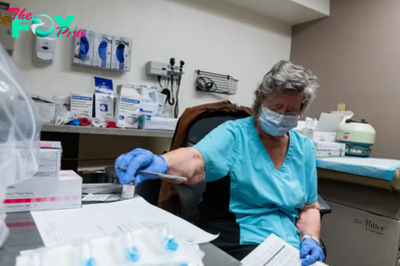Health
Arctic expedition uncovers deep-sea microbes that may harbor the next generation of antibiotics
The frigid waters of the Arctic may harbor the secret to a totally new type of antibiotic, new research suggests.
Scientists have discovered that substances made by Arctic Ocean microbes called actinobacteria can stop harmful bacteria from growing and prevent them from causing disease.
Around 70% of existing antibiotics were discovered in actinobacteria, most of whom live in soil on land. However, bacteria are becoming increasingly resistant to existing antibiotics, meaning that new drugs are urgently needed.
So, researchers looked to sea-dwelling actinobacteria for new antibiotics. The sea-dwelling microbes are thought to produce a more chemically diverse array of compounds than their land-dwelling counterparts make. This is because of the selective pressure created by the extreme fluctuations in pressure, temperature, salt concentrations and light levels that occur in marine environments.
Related: For C. diff, antibiotic resistance comes at a cost
In the new study, scientists analyzed hundreds of unknown compounds that had been extracted from actinobacteria living inside invertebrates. The samples were collected during an expedition to the Arctic Ocean in 2020. Specifically, they tested how the compounds affected a pathogenic type of E. coli called enteropathogenic E. coli (EPEC). These bacteria infect intestinal cells and cause severe diarrhea, particularly in children.
Next, scientists looked at whether compounds produced by four species of actinobacteria could stop EPEC bacteria from infecting lab-grown cells. They found that two compounds had particularly strong antibacterial properties: one from a strain of actinobacteria from the Rhodococcus genus and another from a strain belonging to the Kocuria genus. They described their findings in a paper published Friday (Aug. 30) in the journal Frontiers in Microbiology.
-

 Health1d ago
Health1d agoPeople Aren’t Sure About Having Kids. She Helps Them Decide
-

 Health1d ago
Health1d agoFYI: People Don’t Like When You Abbreviate Texts
-

 Health1d ago
Health1d agoKnee problems tend to flare up as you age – an orthopedic specialist explains available treatment options
-

 Health1d ago
Health1d agoThe second Trump presidency could mean big changes for health insurance in Colorado
-

 Health2d ago
Health2d agoIs It Time to Worry About Bird Flu?
-

 Health2d ago
Health2d agoJared Polis praises Trump for choosing anti-vaccine activist Robert F. Kennedy Jr. as health secretary
-

 Health2d ago
Health2d agoJohn Cena’s Workout Routine And Diet Plan: How The WWE Superstar Stays In Shape
-

 Health2d ago
Health2d agoSleep Doctors Share the 1 Tip That’s Changed Their Lives



























